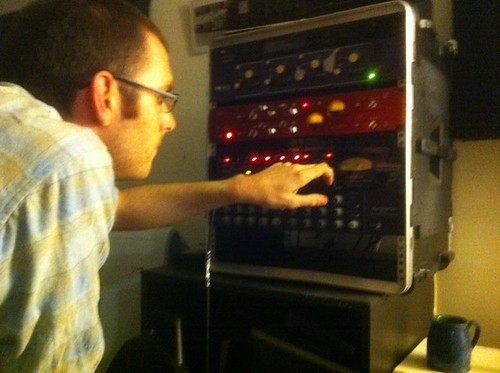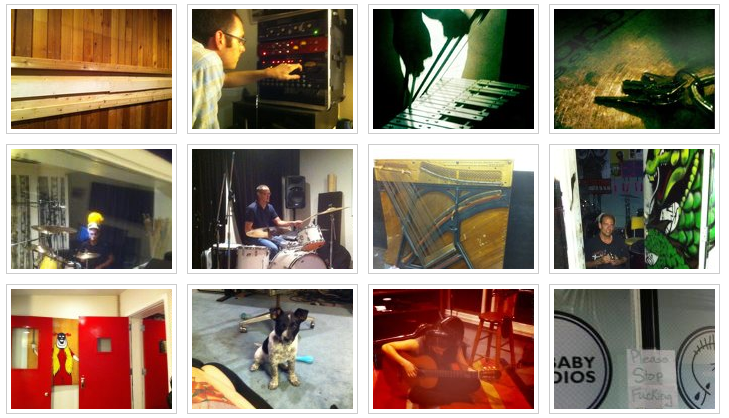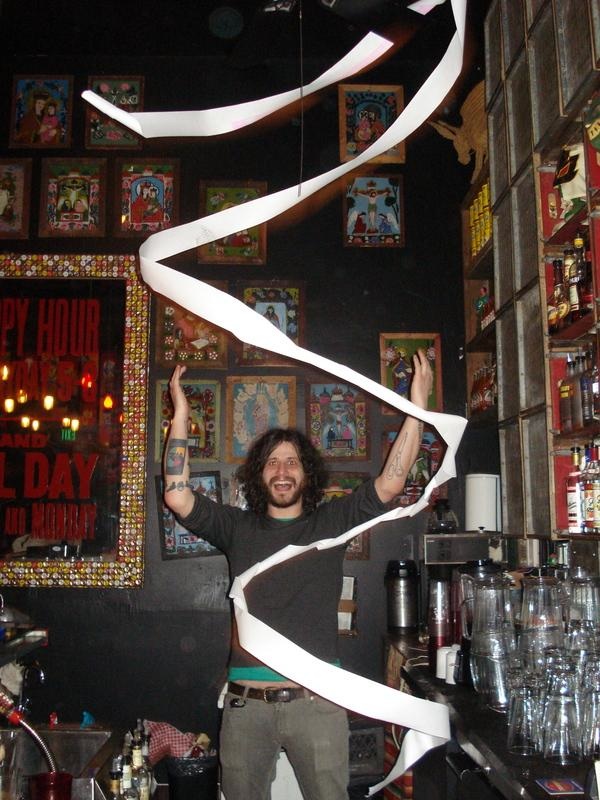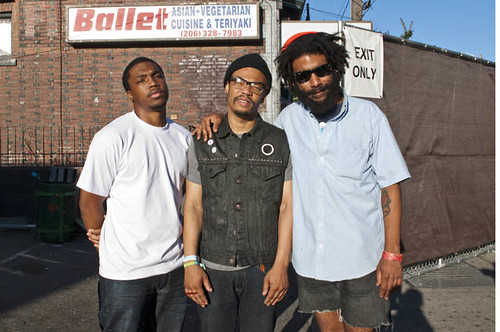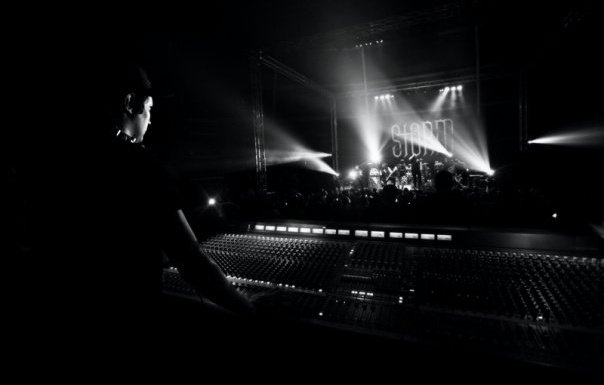 Josh Penner at work — “a few years ago somewhere in Arkansas on a Demon hunter tour” (Image courtesy Josh Penner)
Josh Penner at work — “a few years ago somewhere in Arkansas on a Demon hunter tour” (Image courtesy Josh Penner)
As CHS looks at the culture and economy of Capitol Hill’s live music artists and businesses, we tend to focus on some of the smaller, finer points of it all. Twiddling the knobs, so to speak, of an important part of the Hill. This week we talk with Neumos sound crew members Josh Penner and Alice Wilder, two diligent soldiers of audio who, unlike the rock stars they work with, are rarely in the spotlight. These engineers provide a vital component of what makes a Capitol Hill show great. Here’s their take on what they see (and hear) from the back of the club and what it’s like to work the boards at one of Capitol Hill’s premier music venues.
CHS: Introduction roll call: what’s your job title, how long have you worked at Neumos, and how’d you get the job?
Josh Penner: I have been working at Neumos as lead audio tech for about six months. Rachel [Willner, production manager] and I have been working together going on nine years. She was my boss at Graceland/El Corazon. We also worked together when I would come through town on tour. We work well together and she felt confident in my ability to be a systems tech, to organize the venue, and to run a tight ship.
Alice Wilder: Audio engineer. I got the job by interning at Neumos for about six months beginning in the summer of 2007. I’ve been there ever since.
CHS: Have either of you worked at other venues here in the city, or elsewhere? What do you like about working at Neumos?
JP: I still currently work at El Corazon and the Showbox, as well as tour. I really enjoy working at Neumos because of how well the venue is run. We have a great production staff: Rachel and Kate; audio: Alice, Evan, Kirsten, Ian, Robin; security, etc. Everyone really takes pride in what they are doing. We really like to make Neumos “our home.” Also the PA system sounds awesome. We get a lot of good toys to play with.
AW:Chop Suey and the Showbox. I like Neumos because it’s super dog friendly, which is amazing, the staff is pretty sweet and professional, and I generally like the genres of music that come through.
CHS: How does the room at Neumos stack up next to other Seattle venues in terms of sound?
AW: The PA is fantastic: sounds good with a flat EQ [equalizer], which is rare. Very easy to wrangle in.
JP: We have a great PA system. I have been all over the world touring and I have to say Seattle has some of the best sounding rooms and PAs, but it really comes down to the room. You can put a million dollar sound system in a shitty room and it’s still gonna sound like garbage. We have a great acoustic environment, high ceilings, and balcony. There’s not a lot of places for the sound to bounce around in the room. Plus I always loved standing on the balcony and seeing the side of stage. It makes you feel that much closer to the band, getting to watch every move.
CHS: Where did you pick up the trade and what interests you about sound engineering?
JP: My dad bought me a 4-track recorder for my birthday one year and I started recording my own bands in middle school and high school. When CD burners first came out I was using a recording software to edit and put my stuff on to CD. When it came to college I already knew that recording was what I wanted to do. During my 2nd year of college I started Interning at Studio 7 and after a year I was working shifts and doing live sound full-time. That was a very exciting point in my life–I got to quit my day job and make a living doing what I love. What interests me about sound engineering is it’s all about variables and creativity. So many factors make things sound good or bad. Doing sound is a process of “cleaning up,” of taking things out of the mix to make an instrument “stick out.” It’s very satisfying to take a bunch of instruments, put them in their individual places in a mix, and listen to the end result.
AW: I’ve been interested in sound since high school. Nothing else, job wise, seems as fun, especially not accounting, which was my major in college–fun fact!
CHS: How about a band that made your life hell and why?
AW: [Capitol Hill group who at one point were banned from six Capitol Hill clubs] Mad Rad. I’m guessing I wouldn’t have to go into too much detail on that one. Not to mention the fact that they would probably be into it if they read this.
JP:Danzig loves to throw his microphone at the monitor engineer.
CHS: And one that made your job easy?
JP: Any band or crew that is pro and that walks in at the beginning of the day with a smile on their face. People forget that it is a privilege to make a living doing what we do whether it is a stage tech or a song writer. We are all in this game for the same reason, so let’s make this about the music not your ego. Every band should have to read “Get In The Van” by Henry Rollins before they play their first gig.
AW:The Handsome Furs. They are nicest, coolest people I’ve ever met.
CHS: Favorite Capitol Hill/Seattle bands to work with?
JP: Hmm, well I got my start in the touring world working for [Seattle metal band] Himsa. I really like [Seattle hardcore group] Black Breath. I’ve got to mix He Whose Ox is Gored a few times and that has always been a great time. I will be mixing [Seattle “Psychodelick” group] Master Musicians of Bukkake in a week or so and that is pretty rad.
AW: I’m gonna play the “safe” card here and say too many to name! But I’m also not afraid to cheese out and say that I do have a special thang for Grand Archives.
CHS:Doug Krebs, the sound engineer at the Tractor, recently alleged he’d been “violently attacked” by the frontman for Seattle Sub Pop band The Head and the Heart, claiming the attack was “without any provocation and specifically directed at sound technicians.” Ever been hassled by aggressive and/or drunk bands and if so, how did you deal with it?
JP: I read an article about it. There are always two sides to any story. I




